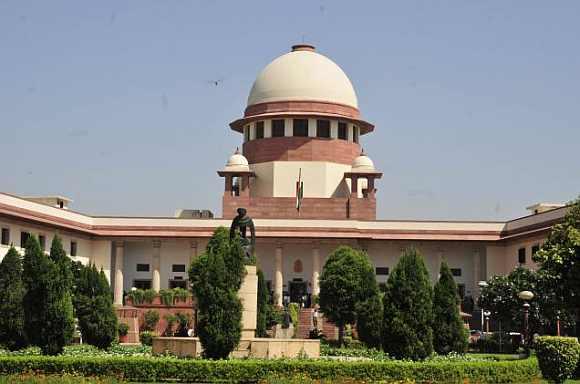Criminal law should not be set into motion without adequate investigation of facts on mere suspicion, the Supreme Court has said while quashing a criminal case against the director of a company.

A bench of Justices R S Reddy and Sanjiv Khanna said vicarious liability is attracted when the offence is committed with the consent, connivance, or is attributable to the neglect on the part of a director, manager, secretary, or other officer of the company.
In law, vicarious liability is the responsibility assigned to an employer, resulting from the actions of an employee.
'Criminal law should not be set into motion as a matter of course or without adequate and necessary investigation of facts on mere suspicion, or when the violation of law is doubtful.
'It is the duty and responsibility of the public officer to proceed responsibly and ascertain the true and correct facts. Execution of law without appropriate acquaintance with legal provisions and comprehensive sense of their application may result in an innocent being prosecuted,' the apex court said.
On the issue of summon, the bench said it is the court's duty not to issue summons in a mechanical and routine manner.
'It is the duty of the magistrate to apply his mind to see whether on the basis of the allegations made and the evidence, a prima facie case for taking cognizance and summoning the accused is made out or not,' the bench said in its October 29 judgment said.
The apex court was hearing an appeal filed by Dayle de Souza challenging an order of Madhya Pradesh, which dismissed his plea seeking quashing of the case against him.
Resultantly, and for the reasons stated above, we would allow the present appeal and quash the summoning order and the proceedings against the present appellant.
The petitioner, director of Writer Safeguard Pvt. Ltd, had entered into an agreement, titled 'Agreement for Servicing and Replenishment of Automated Teller Machines', with NCR Corporation India Private Ltd.
The NCR corporation having earlier entered into an agreement with the State Bank of India for maintenance and upkeep of the State Bank of India's ATMs.
On February 19, 2014, the Labour Enforcement Officer (Central) inspected the SBI's ATM and later issued a notice alleging non-compliance with the provisions of the Minimum Wages Act, 1948, and Minimum Wages (Central) Rules, 1950 at the ATM.
After more than four months, the Labour Enforcement Officer (Central), informed the petitioner and Vinod Singh (director of MP unit) that they were required to appear in the court on August 14, 2014.
On August 14, 2014, the Labour Enforcement Officer (Central) filed a criminal complaint before the court of the Chief Judicial Magistrate, Sagar, Madhya Pradesh, under Section 22A of the Act who took cognisance of the offence and issued a bailable warrant against the appellant and Vinod Singh.
The petitioner later moved the high court for quashing the complaint, which dismissed his petition.











 © 2025
© 2025